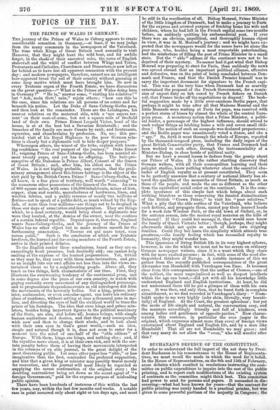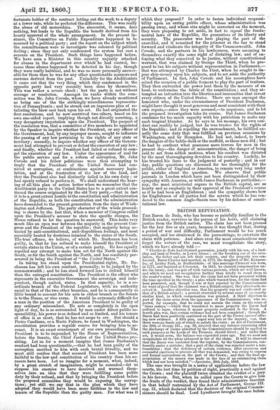B17CHANAN'S DEFENCE OF THE CONSTITUTION.
Ti order to understand the full import of the act done by Presi- dent Buchanan in his remonstrance to the House of Representa- tives, we must recall the mode in which the need for it befell. In the House of Representatives, on the 9th and 13th of February, arose debates which resulted in resolutions instructing the com- mittee on public expenditure to inquire into the cost of the public printing, and to report such modifications of the existing system of contracts as the committee might think best. This committee had power to send for persons and papers. It succeeded in dis- covering—what had been known for years—that the contract for public printing was rarely handed to a practical printer, but was given to some powerful partisan of the majority in Congress ; the
fortunate holder of the contract letting out the work to a deputy at a lower rate, while he pocketed the difference. This was really the abuse of old monarchies. The sinecurist, it seems does nothing, but lends to the Republic the benefit derived from his hearty approval of the whole arrangement. In the present in- stance, the Committee on Public Expenditure happened to be manned by a political party ; and the report on the subject which the committeemen were to investigate was coloured by political feeling ; since they not only condemned the system but cast a censure on the President. Such things have happened before. We have seen a Minister in this country unjustly attacked for abuses in the department over which he had control, be- cause those abuses happened to be detected in his day, though they were really habitual, and he was no more personally answer- able for them than he was for any other questionable manners and customs derived from the past. Unluckily for the Abolitionists it came out that the very thing which they condemned in the opposite party had very recently been done by themselves. This was rather a severe check ; but the party is not without courage or resolution. Amongst its ranks within the com- mittee was Mr. John Covode whom we have already mentioned as being one of the the Arikingly miscellaneous representa- tion of Pennsylvania ; and he struck out an ingenious plan of re- taliating the blow cast back upon his set. He had originated the first resolutions, and he now contrived two others, based on his own one-sided report, implying though not directly asserting, a very derogatory imputation upon the President. The purport of the resolution was, that a committee of five members be appointed by the Speaker to inquire whether the President, or any officer of the Government, had, by any improper means, sought to influence the passing of any law pertaining to the rights of any state or territory ; secondly., to inquire whether any officer of the Govern- ment had attempted to prevent or defeat the execution of any law; and finally, whether the President had failed or refused to com- pel the execution of any law. Under the appearance of zeal for the public service and for a reform of corruption, Mr. John Covode and his fellow politicians were thus attempting to imply that the President of the United States had con- nived at corruption, at combinations against necessary legis- lation and at the frustration of the law of the land, and that the President also had distinctly failed in his own duty ; or had openly refused to perform it. We shall understand the bear- ing of all this plan of action better when we remember that the Abolitionist party in the United States has to a great extent con- tinued the course originated by the old Tory party,—that in fact it is to a great extent hostile to the constitution and administration of the Republic, as both the oonstitution and. the administration have descended to the present generation from the days of Wash- ington and Jefferson. The party character of the whole proceed- ing is shown by the fact that, when a member of Congress called upon the President's accuser to state the specific charges, the House refused to let the question be answered. This looks very much like an open war between the majority in the present Con- gress and the President of the republic ; that majority being ac- tuated by anti-constitutional, anti-Republican feelings' and most especially heated by doctrines inimical to the states of the South. The true offence, we believe, of which Mr. Buchanan has been guilty, is, that he has refused to make himself the President of certain states in the Union, or of a certain party. He has equally repelled any attempt to make him act for the North against the South, or for the South against the North, and has resolutely per- severed in being the President of "the United States."
In taking his stand upon the Presidential rights, Mr. Bu- chanan has left his own conduct, personally, to be judged by the commonwealth ; and he has stood forward less to defend himself than the outraged constitution. The President is the officer who represents in the executive Government the sovereign and inde- pendent, though united, states. In that capacity, he is a co- ordinate branch of the Federal Legislature, with an authority equal to that of the two other branches, and he is consequently as little bound to account for his acts to either branch as the Senate is to the House, or vice versa. It would be extremely difficult for a man in the position of the American President to be guilty of any ordinary misconduct. He acts so completely in the open light of day, he is so surrounded by men under direct public re- sponsibility, his power is so defined and so limited, and his tenure of offioe is so short, that he has not scope to err. But should a Pietro Candiano, or a Marin Faliero, be found in Washington, the constitution provides a regal& course for bringing him to ac- count. It is an exact counterpart of our own proceeding. The President is to be impeached by the House of Representatives, before the Senate, the Chief Justice of the United States pre- siding. Let us for a moment imagine that James Buchanan's conduct had been questionable,—that he had been guilty of the corruption ascribed to him with such brutal frivolity, and we must still confess that that accused President has been more faithful to the law and constitution of his country than his ac- cusers have been. Let us imagine for a moment, what, indeed, by a great stretch of imagination, might be conceded—let us suppose his enemies to have deceived and warmed them- selves into an idea that they were fulfilling some public duty by their refusal, and that by bringing the President before the proposed committee they would be exposing the corrup- tions yet still we say that in the plan which they have adopted they would have been more faithless to the law and tenure of the Republic than the guilty man. For what was it
which they proposed? In order to fasten individual responsi- bility upon an erring public officer, whose administration was passing away, and whose sins might be corrected on the moment, they were proposing to set aside, in fact to repeal the funda- mental laws of the Republic, the guarantees of its liberty and security. The prosecutor was here playing the part of the anarchist, and it remained for the prisoner at the bar to stand forward and vindicate the integrity of the Commonwealth. John Covode, and the partners in his lawlessness, were assuming to themselves exactly the same right of dictating law, and of en- forcing what they conceived to be justice, without constitutional warrant, that was claimed by George the Third, when he pro- posed to tax his subjects without representation in Parliament,— that was attempted by Charles the First, when he sought to im- pose ship-money upon his subjects, and to set aside the authority of Parliament. In fact, John Covode and his accomplices have seized the occasion of a public ferment to play the part of traitors. They then embezzled the power lent them by the measure of an hour, to undermine the fabric of the constitution ; and they at- tempted an infraction into the liberties and immunities that invest every citizen of the United States. There are men amongst the honestest who, under the circumstances of President Buchanan, might have thought it most generous and most consistent with their own repute,—since they were accused,—to acquiesce, and to let the proposed investigation take its course. But James Buchanan combines far too much sagacity with his patriotism to make any such tragical blunder. As he says in his message, his own con- duct can readily be judged, but he was trustee for the rights of the Republic ; and in repelling the encroachment, he fulfilled ex- actly the same duty that was fulfilled on previous occasions by Washington, and by Hampden. He had not, indeed, to brave the dangers of the battle-field. or the scaffold, as those men did ; but he had to confront what possesses more terrors for men in the present day—the danger of misconstruction, the danger of being said to act from selfish motives, when his conduct was dictated by the most thoroughgoing devotion to his country. Luckily, he has trusted his fame to the judgment of posterity ; and in our day, public questions are discussed far too thoroughly for the public, either of England or America, to remain very long under any mistake about the question. We observe that public journals in London which have not been distinguished by their sympathy with America, or with James Buchanan in particular,— nay, the most ministerial organs in the British capital, are as hearty and as emphatic in their approval of the President's course as if he had been an Englishman ; and the sympathy shows how far Englishmen of all parties feel the service which he has ren- dered to the common Anglo-Saxon race by his defence of consti- tutional law.



























 Previous page
Previous page